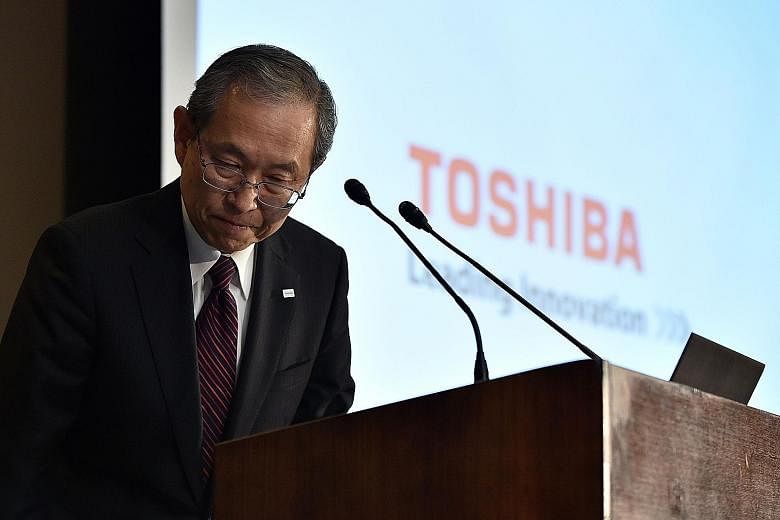TOKYO • The troubles at crisis-hit Toshiba are the latest in a string of business scandals that highlight how the backbone of Japan's corporate culture - unwavering employee loyalty - can sometimes lead to disaster, analysts say.
The firm's stock has been sliced in half since late December when it first flagged multibillion-dollar losses at US nuclear unit Westinghouse Electric, and revealed allegations of accounting fraud by senior managers at the division.
Yesterday, Toshiba won approval to delay until April 11 the release of its October-December earnings for a second time as it probed the embarrassing allegations, with fears growing that the pillar of corporate Japan could be delisted from the Tokyo bourse. Chief executive Satoshi Tsunakawa also said he expected Westinghouse to attract interest from potential buyers, given its stable fuel and services business.
The accounting scandal came less than two years after its reputation - and balance sheet - was hammered by separate revelations that top executives pressured underlings to cover up weak results for years after the 2008 global financial crisis. But Toshiba is not the only Japanese company facing such problems.
Camera giant Olympus covered up losses of up to US$1.7 billion (about S$2.4 billion) some years ago, while employees at Mitsubishi Motors faked fuel-economy tests. Staff at auto-parts giant Takata were also found to have hidden deadly airbag defects.
Such behaviour may be due to misplaced company loyalty, observers said. "Many a time, corporate governance missteps and failure in other countries are motivated by personal greed," said Mr Nicholas Benes of non-profit Board Director Training Institute of Japan. "Here, more often people think they are doing it for the company's interest."
This allegiance is closely linked to post-war Japan's meteoric rise from a shattered nation to the world's No. 2 economy. Employees did not ask questions and devoted themselves to the company's success in return for lifetime employment. Those powerful bonds have weakened over the decades as the economy soured and firms laid off workers.
But the structure of corporate Japan still puts a company's reputation above all else, which sometimes leads to hiding facts, delaying announcements or trying to meet a superior's impossible demands, analysts said. "They tend to think that if this problem comes to light, it's going to drag down the company's stock price," said a former Japanese government official who worked on corporate management and governance issues. Most major Japanese firms still hire university graduates right out of school and groom them to stay for their whole career. "When you enter a company and work there for a long time, you get soaked in the company's code," said Professor Nobutaka Kazama of Meiji University in Tokyo.
A stock and asset price bubble that burst in the early 1990s ushered in years of slow growth and deflation, with once-mighty Japan falling behind China as the dominant Asian economic power.
In response, many Japanese firms restructured, letting go of middle managers who seldom held top managers in check, Prof Kazama said. Collusion in the senior executive ranks and poor external controls have also been fingered as culprits in previous scandals.
Japanese firms are peppered with former bureaucrats given plum jobs in the industries that they once oversaw, despite many having few relevant skills or the incentive to question management.
In Toshiba's case, an investigation of the 2015 accounting scandal found a pair of former diplomats on its audit committee who were not up to the task, among a litany of other problems.
In the aftermath, Toshiba sold off assets - including a medical device unit and most of its home appliance business - and fired thousands.
Now, it is in trouble again and has put its prized memory chip business on the block to raise cash. "The system of lifetime employment leads to a lack of accountability on performance which is directly contrary to the reforms the government is trying to put in place," said Mr Benes. "These reforms will not work until the mindset about the labour system changes in Japanese companies."
AGENCE FRANCE-PRESSE

